Wesleyan Bible Commentary (7 vols.)
Digital Logos Edition
Overview
The 7-volume Wesleyan Bible Commentary is the first multi-volume commentary on the whole Bible by a distinguished community of Wesleyan scholars—representing nine evangelical denominations. The commentary takes advantage of the latest and best information available to present-day Bible scholars. This series maintains both the spiritual insight and sound biblical scholarship of John Wesley and Adam Clarke, but expresses these characteristics in the context of contemporary thought and life. The resulting commentary is cast in the framework of contemporary evangelical Wesleyan Bible scholarship.
For many years the authors and publishers have sensed the need for a modern, practical Bible commentary from a broadly evangelical and uniquely Wesleyan perspective—the Wesleyan Bible Commentary meets this need. This commentary series aims for a high level of sound biblical scholarship, with a purpose that is practical rather than technical. The design of the series is evangelical, expositional, practical, homiletical, and devotional. Pastors will find these commentaries particularly useful for sermon preparation, and laypersons and students will find them ideally suited for research projects and personal study.
With the Logos edition of the Wesleyan Bible Commentary, you can perform powerful searches and access a wealth of information on the Bible quickly and easily! Hovering over scripture references displays the text from the Greek New Testament or your English translation, and you can link the Wesleyan Bible Commentary to the other commentaries in your digital library for accurate research and a fuller understanding of the Bible.

- Detailed outline for each book of the Bible
- Lengthy introductions to each book, which discuss historical, authorship, and interpretive issues
- Charts and diagrams supplement detailed exposition
- Technical language confined to footnotes for further research
- Extensive bibliography provided for each book of the Bible
…A commentary whose distinctives justify its existence…based on recent scholarship and couched in contemporary terms…The text includes helpful discussions of first-century customs and historical backgrounds, as well as an enlightening use of the Greek text, always explained in terms understandable to one who reads only English.
—Dr. Donald W. Burdick, Conservative Baptist Seminary
…A welcome contribution to the growing body of contemporary religious literature stemming from the Wesleyan-Arminian theological position…representing sound scholarship, with faithfulness to vital evangelical concepts…
—Dr. Hugh C. Benner, Superintendent, Church of the Nazarene
Couched in contemporary terms and based on recent scholarship, the Wesleyan Bible Commentary is a significant contribution to the field of biblical studies.
—Dr. Gordon Zimmerman, Taylor University
This commentary bridges a gap between the times and writings of such men as John and Charles Wesley, Adam Clarke, and Daniel Steel…and its practicality and relevance…make it extremely valuable for both ministry and laity.
—Dr. Kenneth E. Geiger, United Missionary Church
The Wesleyan Bible Commentary takes full advantage of the latest and best information available to present-day Bible scholars…
—Dr. Harold B. Kuhn, Asbury Theological Seminary
- Title: Wesleyan Bible Commentary (7 vols.)
- Editor: Charles W. Carter
- Publisher: Eerdmans
- Volumes: 7
- Pages: 4,460
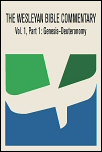
Lee Haines served as pastor of Eastlawn Wesleyan Methodist Church in Indianapolis, Indiana. He graduated from Marion College in 1950 summa cum laude, where he later served as an instructor in Greek and religion.
Armor D. Piesker graduated from Colorado College and Butler University, where he did his graduate studies and thesis in the field of Old Testament. He served as editor of The Pilgrim Holiness Advocate, and also wrote a weekly column in the Frankfort (Indiana) Morning Times.
Howard A. Hanke received his B.A. degree from Asbury College, his B.D. from the Perkins School of Theology, and his Th.D. from Iliff School of Theology. He served as professor of Bible at Asbury College, and was an ordained minister in the Rocky Mountain Conference of the Methodist Church. Hanke participated in the Evangelical Theological Society, the National Education Association, and the National Association of Professors of Hebrew, and served on the summer faculty of New York University.
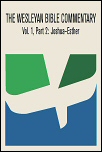
Charles R. Wilson attended Miltonvale College, and he holds the A.B. degree from Northwestern College at Alva, Oklahoma, the B.D. from Asbury Theological Seminary, the M.A. in philosophy from Syracuse University, and the Ph.D. in theology from Vanderbilt University. He also did graduate study at Capital University. Wilson also holds membership in the Society of Biblical Literature. He was co-editor of Boundless Horizons, and has contributed numerous articles to religious periodicals and scholarly journals. He was ordained in the Wesleyan Methodist Church of America.
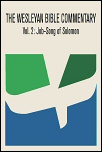
Charles W. Carter was chairman of the department of philosophy and religion at Taylor University, and general editor of the Wesleyan Bible Commentary. He served for many years as pastor in the Wesleyan Methodist Church of America, and had a rich ministry as an educator, editor, author, lecturer, and missionary. He was also chairman of the editorial board of the Wesleyan Theological Journal. Carter authored or co-authored more than ten books, and frequently contributed to various religious periodicals and journals.
W. Ralph Thompson served as chairman of the department of philosophy and religion at Spring Arbor College. He holds the A.B. and Th.B. degrees from Greenville College, the B.D. from Winona Lake School of Theology, the S.T.B. from the Biblical Seminary in New York, the M.A. from Ball State University, and the Th.M. and Th.D. degrees from Northern Baptist Theological Seminary. He was an ordained minister in the Free Methodist Church, a member of the American Academy of Religion, the Evangelical Theological Society, the National Holiness Association, and the Wesleyan Theological Society.
George Herbert Livingston was professor of Old Testament at Asbury Theological Seminary. He attended Wessington Springs College, where he graduated with the B.A. degree in 1937. He also received at B.A. degree from Kletzing College; in 1948 he received the B.D. degree from Asbury Theological Seminary, and in 1955 he was awarded the Ph.D. from Drew University. He is an ordained minister in the Free Methodist Church, and has pastored churches in Wisconsin and Iowa. He has preached and lectured extensively at churches, camps, ministerial groups, and colleges in America, Europe, and Asia.
George Kufeldt was Associate Professor of Old Testament studies at the School of Theology, Anderson College, of the Church of God. He attended Anderson College, and has served as a pastor. He is thoroughly acquainted with the Hebrew language and with Old Testament literature.
Dennis Kinlaw was professor of Old Testament languages and literature at Asbury Theological Seminary. He earned the A.B. degree from Asbury College, the B.D. degree from Asbury Theological Seminary, and the M.A. and Ph.D. degrees from Brandeis University. He has also done graduate study at Princeton Theological Seminary and at New College, Edinburgh, Scotland. Kinlaw has written extensively for religious periodicals and scholarly journals, and has contributed to numerous publications.
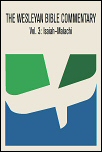
Kenneth E. Jones served as professor of biblical languages at Warner Pacific College. He attended Anderson College, Oberlin Graduate School of Theology, Louisville Presbyterian Seminary, and Winona Lake School of Theology. He has served at Alberta Bible Institute and Gulf Coast Bible College, and has published numerous books and commentaries. He is an ordained minister in the Anderson Church of God.
Bert H. Hall was chairman of the division of theology and Christian education at Houghton College. He attended Houghton College, Northern Baptist Theological Seminary, and New College, University of Edinburgh, Scotland.
Claude A. Ries served as a professor at Houghton College. He attended Asbury College, Syracuse University, Winona Lake School of Theology, and Northern Baptist Theological Seminary. He has taught English, Greek, and theology throughout his career, and was an ordained minister in the Rochester Conference of the Wesleyan Methodist Church of America.
W. Ralph Thompson served as chairman of the department of philosophy and religion at Spring Arbor College. He holds the A.B. and Th.B. degrees from Greenville College, the B.D. from Winona Lake School of Theology, the S.T.B. from the Biblical Seminary in New York, the M.A. from Ball State University, and the Th.M. and Th.D. degrees from Northern Baptist Theological Seminary. He was an ordained minister in the Free Methodist Church, a member of the American Academy of Religion, the Evangelical Theological Society, the National Holiness Association, and the Wesleyan Theological Society.
J. Kenneth Grider was professor of theology at Nazarene Theological Seminary. He attended Olivet Nazarene College, Nazarene Theological Seminary, Drew University, Glasgow University, and Oxford University. He also held positions as Associate Professor of Theology at Pasadena College and Hurlet Nazarene College. Grider has authored numerous books and articles, and is an ordained minister in the Church of the Nazarene.
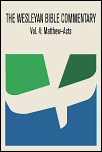
Ralph Earle was professor of New Testament at the Nazarene Theological Seminary in Kansas City, Missouri. He attended Eastern Nazarene College, Boston University, Gordon Divinity School, and did post-doctoral studies at Harvard and Edinburgh Universities. He is an ordained minister in the Church of the Nazarene.
Harvey J. S. Blaney served as professor of religion and chair of the graduate division of theological studies at Eastern Nazarene College. He holds degrees from Eastern Nazarene College, Yale University, Harvard University, and Boston University. He is an ordained minister in the Church of the Nazarene, and has pastored Baptist, Congregational, and Nazarene congregations.
Charles W. Carter was chairman of the department of philosophy and religion at Taylor University, and general editor of the Wesleyan Bible Commentary. He served for many years as pastor in the Wesleyan Methodist Church of America, and had a rich ministry as an educator, editor, author, lecturer, and missionary. He was also chairman of the editorial board of the Wesleyan Theological Journal. Carter authored or co-authored more than ten books, and frequently contributed to various religious periodicals and journals.
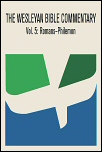
Wesleyan Bible Commentary, Vol. 5: Romans–Philemon
- Authors: Wilber T. Dayton, Charles W. Carter, Clarence H. Zahniser, George A. Turner, W. O. Klopfenstein, Roy S. Nicholson, and George E. Failing
- Editor: Charles W. Carter
- Publisher: Eerdmans
- Publication Date: 1966
- Pages: 675
Wilber T. Dayton is Professor of New Testament and Greek at Asbury Theological Seminary. Throughout his career, he served as the chair of the department of religion at Wessington Springs College, Professor of Theology and Greek at the Divinity School of Marion College, Professor of New Testament Interpretation and Language at Asbury Theological Seminary. He is an ordained minister in the Indiana Conference of the Wesleyan Methodist Church of America.
Charles W. Carter was chairman of the department of philosophy and religion at Taylor University, and general editor of the Wesleyan Bible Commentary. He served for many years as pastor in the Wesleyan Methodist Church of America, and had a rich ministry as an educator, editor, author, lecturer, and missionary. He was also chairman of the editorial board of the Wesleyan Theological Journal. Carter authored or co-authored more than ten books, and frequently contributed to various religious periodicals and journals.
Clarence H. Zahniser was Associate Professor of Bible at Houghton College. He attended Greenville College, Pittsburg Theological Seminary, and the University of Pittsburg.
George A. Turner was Professor of Biblical Literature at Asbury Theological Seminary. He is the author of numerous books and articles, and an active member of the Society of Biblical Literature and the Evangelical Theological Society.
W. O. Klopfenstein attended Fort Wayne Bible Institute and Northern Baptist Theological Seminary. He served as a pastor in Missionary Churches and Baptist Churches.
Roy S. Nicholson attended Central Wesleyan College and Houghton College. He was ordained to the ministry of the Wesleyan Methodist Church in the North Carolina Conference in 1925.
George E. Failing attended Eastern Pilgrim College, Houghton College, and Duke University. He was ordained to the ministry of the Wesleyan Methodist Church by the Lockport Conference in New York. He has taught biblical languages, religion, and theology at both Central Wesleyan College and Houghton College.
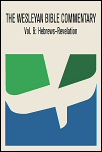
Charles W. Carter was chairman of the department of philosophy and religion at Taylor University, and general editor of the Wesleyan Bible Commentary. He served for many years as pastor in the Wesleyan Methodist Church of America, and had a rich ministry as an educator, editor, author, lecturer, and missionary. He was also chairman of the editorial board of the Wesleyan Theological Journal. Carter authored or co-authored more than ten books, and frequently contributed to various religious periodicals and journals.
R. Duane Thompson served as professor of philosophy and Greek at Marion College.
Charles S. Ball is pastor of Friends Church in Newburg, Oregon.
Leo G. Cox served as chair of the division of religion and philosophy at Marion College.
Harvey J. S. Blaney served as professor of religion and chair of the graduate division of theological studies at Eastern Nazarene College. He holds degrees from Eastern Nazarene College, Yale University, Harvard University, and Boston University. He is an ordained minister in the Church of the Nazarene, and has pastored Baptist, Congregational, and Nazarene congregations.
Reviews
5 ratings

chad ron
10/11/2024
In it's intro, The Wesleyan Bible Commentary (WBC) describes itself as "a six-volume commentary" with three OT and three NT volumes. They add that the first volume is "divided into two books, Vol. I—Part I, and Vol. I—Part II," which if you were to buy it off of the shelf, would give you seven physical books. Logos follows the WBC lead so that the seven volumes in your collection are labeled as volumes 1 through 6. All sixty-six books of the Protestant Bible are covered. With copyrights dating from 1966 through 1969 this is an older commentary produced before a lot of political correctness crept into the Church The intro also informed me that staff involved with the commentary project was "selected from nine different denominations, which include the Church of God, . . .Church of the Nazarene, Evangelical United Brethren, Free Methodist, Friends, Methodists, Missionary Church Association, Pilgrim Holiness, and Wesleyan Methodist." The WBC includes the text from the American Standard Version where Jonah 2 verse 1 reads: "Then Jonah prayed unto Jehovah his God out of the fish’s belly." W. Ralph Thompson, who was ordained in the Free Methodist Church, provides the commentary here. In part he tells his readers, "One of the brightest truths that shines through Jonah’s prayer is that neither circumstances nor place puts the repentant sinner beyond the reach of a merciful God. While rebellion closes God’s ear ([Psalm 66 verse 18]), no place is too distant or dark for the penitent to be heard" (Vol 3, p 663). Fabulous!AnonymousUser123
9/23/2024
Volume 1 appears to use the ASV as the base translation for the text, for anyone that wants to know. I presume the other volumes follow suit.Per Bradley
6/19/2020
Tom Tuppenney
7/8/2018

Scott J Sherwood
5/23/2016
James Whited
4/22/2015
Titus Gilbert
2/26/2014